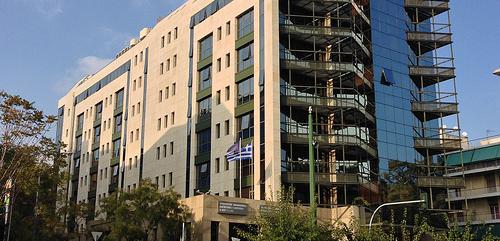An ongoing dispute between energy minister Panos Skourletis and the TAIPED (State Privatization Fund) chief Stergios Pitsiorlas over the latter’s intention to privatize 17 percent of the main power utility PPC, currently controlled by the Greek State with a 51.12 percent share, is just the tip of the iceberg that conceals wider, more substantial differences.
TAIPED’s leadership is basing its privatization intentions on agreements reached by Greece’s preceding administrations with the country’s lenders, the energy minister argues. Besides the sale of PPC’s 17 percent, this privatization agenda also includes selling 66 percent of DEPA (Public Gas Corporation) and 35 percent of ELPE (Hellenic Petroleum). On the contrary, the energy ministry, attempting to revise this plan, is promoting a wider utilization strategy for the country’s energy companies in which the Greek State holds stakes. The Syriza-led coalition’s new super-privatization fund in the making, which would demote TAIPED as a subsidiary, will generally seek to utilize rather than sell.
Comments offered by various energy ministry officials to energypress converge on a view supporting that the sale of the Greek State’s stakes in companies such as PPC, ELPE, DEPA, IPTO, the power grid operator, and DESFA, the natural gas grid operator, will not add to the economy’s value, as could be the case with OLP, the Piraeus Port Authority. Moreover, utilizing the Greek State’s energy-sector stakes through more intelligent means, the stock exchange being a key element, could attract investments, offer multiplying effects and establish energy companies as a growth tool for the economy, the energy ministry officials contend.
Instead of selling the Greek State’s 35 percent of ELPE, energy ministry officials believe the company should be bolstered by broadening its activites and maintaining its stakes in the natural gas sector, or DEPA and DESFA, assuming the gas operator is not eventually sold to Socar. ELPE holds 35 percent stakes in DEPA and DESFA.
As for PPC, rather than sell a 17 percent stake, the energy ministry intends to establish at least one partnership with a private-sector firm. The utility will provide existing facilities and be a minority shareholder.
The ministry’s plan for IPTO, entailing the transfer of a 51 percent stake from parent company PPC to the Greek State, a sale of 24 percent to a strategic investor, and the remaining 25 percent through the bourse, is already in progress.
The ministry has not questioned its obligation to complete a sale procedure offering 66 percent of DESFA to Azeri energy firm Socar, the winning bidder of an international tender completed in 2013. It was delayed by European Commission intervention demanding that Socar surrender 17 percent to a certified European operator. Most recently, an amendment drafted by Skourletis and his team, limiting DESFA’s network usage fee hikes, and, therefore, the operator’s revenue potential, has upset Socar officials, who appear set to withdraw, without any legal repercussions, as two years have elapsed since the tender’s completion.
Skourletis, who argues that the government inherited the DESFA sale plan from previous administrations, has not hidden his preference for a relaunch based on the IPTO model.





